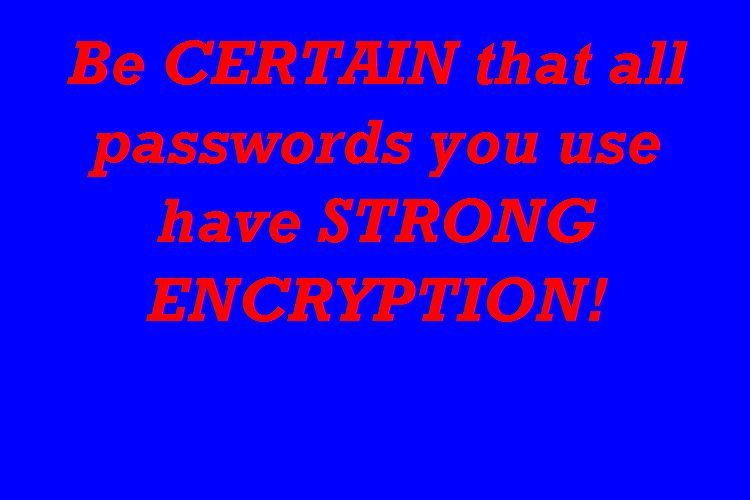Password Encryption MUST Be The Strongest Without Exception

This is no longer a questionable subject. Using a password such as "password" or "myname" meaning George or Julie or anything so simplistic is a straight up invitation to allow a hacking attack. The world is always changing and with that so does our existence on the Internet. Each website anyone visits is potentially vulnerable to interception of traffic data and many websites exist in a compromised condition meaning that those have already suffered some variation of malware infection making their incoming (and outgoing) traffic data vulnerable to hacking attack. In many cases security software you may have installed in your system can detect and warn about or even stop such attacks but that is simply not always true. Internet security is not only a tough thing to understand it is also constantly evolving. This fact alone makes it clear that password encryption MUST be the strongest without exception.
Here's a thought: Don't use just four or eight characters to make a password and don't use names OR words found in a dictionary. Use nine or twelve characters and no words at all, none whatsoever. Words have no place in passwords. Security is what needs to be in place to create secure passwords. Your accounts at Amazon and PayPal as well as your online banking and really any online website requiring a password protected account should all be created in a secure HTTPS online environment which you can determine by the URL in your Internet browser address bar. Take a look at that address right now and you'll see that https://resolvecomputer.com is SECURE. This means that your information is private and and secured by the SSL (Secure Socket Layer) and/or TLS (Transport Layer Security) protocols. That layer of security is something you should be aware of and remember that if it's not there (meaning no SECURE indicator in the address bar) your information including your password is all the more vulnerable to hacking attack. The other layer of security is up to you and that means using strong password encryption. To that end there are several criteria to carefully consider and these are what we all need to bear in mind to keep our passwords as secure as possible nowadays.
Criteria For Creating Strong Password Encryption
Password encryption is not some joke or something to be taken lightly. It is entirely the opposite and if you do not currently have your passwords strongly encrypted you should definitely take action to resolve that situation. The first thing to consider is the number of characters used and this is directly related to the ability of hacking software to decrypt and read the password. The next thing to consider is the use of "special characters" which include such characters as ! @ # $ % ^ & * ( ) and others which make the effort of hacking even more difficult. Think complexity. Many websites will dictate a certain level of complexity when creating a password and may even offer a password generator which will create a password with strong encryption automatically. If you are offered that option use it and be sure to save that password for future reference. If however you are generating your own password be certain to use as high a number of characters including special characters as you are comfortable using. Avoid systematic character use such as 1,2,3 or a,b,c or qwerty (anything "keyboard systematic") and completely avoid words of any kind as part of a password. One more thing to avoid is repeating characters so if your password is 1AMs00SilLy#24 it does have a sufficient number of characters but still falls short of truly strong encryption for multiple reasons. AM is a word, SilLy is a word even where one "L" is capitalized, and the two zeros are repeated right next to each other. To fix that a far better variation would be 1@Mso0S1Ly#204. See the difference? Following these criteria will help to make your passwords among those with the strongest encryption!
